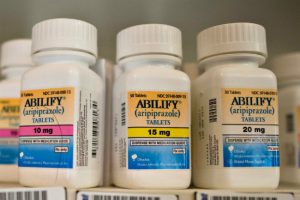 In March, the relatively popular anti-psychotic drug Abilify was pointed as the cause for gambling addiction in two separate lawsuits in British Columbia. While there is still no development in the Canadian cases, hundreds of lawsuits against the prescription drug may be settled in the United States in the coming months. This became clear last week after a federal judge issued an order for finalizing a global settlement.
In March, the relatively popular anti-psychotic drug Abilify was pointed as the cause for gambling addiction in two separate lawsuits in British Columbia. While there is still no development in the Canadian cases, hundreds of lawsuits against the prescription drug may be settled in the United States in the coming months. This became clear last week after a federal judge issued an order for finalizing a global settlement.
In Canada and the United States, Abilify is prescribed for treating schizophrenia, bipolar disorder, and major depression. The drug, however, has been found to come with severe side effects such as compulsive behaviour, including uncontrollable gambling, hypersexuality, and binge shopping. Patients, who have filed suits against its maker and distributor, claim that the said adverse effects were not properly publicized on the label. This made many people develop compulsive gambling habits and as a result, led to huge gambling losses, plaintiffs say.
The lack of proper warning on the label is the reason behind more than 900 lawsuits in the US against Abilify’s manufacturer, the Japanese company Otsuka Pharmaceutical Co. Ltd. The American and Canadian divisions of the company, as well as the distributors of the drug, Bristol-Myers Squibb Co. and Bristol-Myers Squibb Canada Co., have also been named as defendants. The recently issued order by Chief U.S. District Judge M. Casey Rodgers comes in a multi-district litigation in Pensacola, Florida. In his May 2 Global Settlement Order, he gives the two parties a deadline (September 1) for finalizing the framework for a global settlement.
The multi-district litigation Judge Rogers is overseeing combines over 800 pending federal lawsuits against Abilify. The people who filed them say the drug caused them to gamble compulsively and lose large amounts of money. These multi-district litigations are used by federal courts in order to manage a large number of cases regarding the same issue. The global settlement, on the other hand, is a settlement between defendants, often large corporations such as Otsuka Pharmaceutical Co. Ltd, and multiple plaintiffs. The actual number of state and federal cases against Abilify across the United States is actually over 900 and there are more pending lawsuits in Canada as well.
Three Cases Already Reached Settlements
 On April 28, Rogers announced that three bellwether cases have already been settled. These are the lawsuits filed by plaintiffs Fanny Lyons, Jennifer Lilly and David Viechec and scheduled to go in court this summer. However, individual settlements have been reached and undisclosed amounts of money have been paid to the plaintiffs. The bellwether cases serve as early cases in a multi-district litigation to help the two parties negotiate more easily and agree on the terms in a future settlement.
On April 28, Rogers announced that three bellwether cases have already been settled. These are the lawsuits filed by plaintiffs Fanny Lyons, Jennifer Lilly and David Viechec and scheduled to go in court this summer. However, individual settlements have been reached and undisclosed amounts of money have been paid to the plaintiffs. The bellwether cases serve as early cases in a multi-district litigation to help the two parties negotiate more easily and agree on the terms in a future settlement.
For most patients suing Abilify in the United States, this means that the issue will likely be resolved in the coming months. For those who have filed lawsuits against the Japanese drug maker and its local partners in Canada, the recent judge’s order may not mean much, but if a settlement is inked, it would be a positive sign for plaintiffs in British Columbia. Despite the huge differences between the legal systems in the two countries, they still share a lot in common. Whether the prescription drug, which is used for treating all sorts of mental disorders in Canada, would be found the cause for people’s gambling losses or not remains to be seen.



















